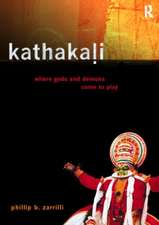Embodied Philosophy in Dance: Gaga and Ohad Naharin's Movement Research: Performance Philosophy
Autor Einav Katan-Schmiden Limba Engleză Paperback – 27 iun 2018
| Toate formatele și edițiile | Preț | Express |
|---|---|---|
| Paperback (1) | 738.07 lei 17-23 zile | +72.87 lei 6-10 zile |
| Palgrave Macmillan UK – 27 iun 2018 | 738.07 lei 17-23 zile | +72.87 lei 6-10 zile |
| Hardback (1) | 775.25 lei 6-8 săpt. | |
| Palgrave Macmillan UK – 27 sep 2016 | 775.25 lei 6-8 săpt. |
Din seria Performance Philosophy
- 18%
 Preț: 775.25 lei
Preț: 775.25 lei -
 Preț: 389.70 lei
Preț: 389.70 lei -
 Preț: 387.78 lei
Preț: 387.78 lei - 15%
 Preț: 576.41 lei
Preț: 576.41 lei - 15%
 Preț: 639.57 lei
Preț: 639.57 lei - 9%
 Preț: 743.12 lei
Preț: 743.12 lei -
 Preț: 217.89 lei
Preț: 217.89 lei - 15%
 Preț: 641.03 lei
Preț: 641.03 lei - 18%
 Preț: 888.67 lei
Preț: 888.67 lei - 15%
 Preț: 637.78 lei
Preț: 637.78 lei - 15%
 Preț: 697.70 lei
Preț: 697.70 lei - 18%
 Preț: 724.65 lei
Preț: 724.65 lei - 15%
 Preț: 524.75 lei
Preț: 524.75 lei -
 Preț: 227.25 lei
Preț: 227.25 lei - 18%
 Preț: 889.16 lei
Preț: 889.16 lei - 15%
 Preț: 496.73 lei
Preț: 496.73 lei -
 Preț: 382.63 lei
Preț: 382.63 lei - 15%
 Preț: 519.38 lei
Preț: 519.38 lei - 18%
 Preț: 773.97 lei
Preț: 773.97 lei - 15%
 Preț: 520.07 lei
Preț: 520.07 lei -
 Preț: 449.32 lei
Preț: 449.32 lei - 23%
 Preț: 585.65 lei
Preț: 585.65 lei - 18%
 Preț: 776.66 lei
Preț: 776.66 lei - 27%
 Preț: 705.09 lei
Preț: 705.09 lei -
 Preț: 315.95 lei
Preț: 315.95 lei - 27%
 Preț: 667.93 lei
Preț: 667.93 lei - 23%
 Preț: 643.86 lei
Preț: 643.86 lei - 32%
 Preț: 526.54 lei
Preț: 526.54 lei
Preț: 738.07 lei
Preț vechi: 811.06 lei
-9% Nou
Puncte Express: 1107
Preț estimativ în valută:
141.31€ • 144.96$ • 118.98£
141.31€ • 144.96$ • 118.98£
Carte disponibilă
Livrare economică 01-07 februarie
Livrare express 21-25 ianuarie pentru 82.86 lei
Preluare comenzi: 021 569.72.76
Specificații
ISBN-13: 9781349956296
ISBN-10: 1349956295
Ilustrații: XVIII, 228 p. 10 illus. in color.
Dimensiuni: 148 x 210 mm
Greutate: 0.33 kg
Ediția:Softcover reprint of the original 1st ed. 2016
Editura: Palgrave Macmillan UK
Colecția Palgrave Macmillan
Seria Performance Philosophy
Locul publicării:London, United Kingdom
ISBN-10: 1349956295
Ilustrații: XVIII, 228 p. 10 illus. in color.
Dimensiuni: 148 x 210 mm
Greutate: 0.33 kg
Ediția:Softcover reprint of the original 1st ed. 2016
Editura: Palgrave Macmillan UK
Colecția Palgrave Macmillan
Seria Performance Philosophy
Locul publicării:London, United Kingdom
Cuprins
Part I. Embodied Philosophy in Dance.- Chapter 1. Dance and Philosophy.- Chapter 2. Dance as Embodied Philosophy.- Chapter 3. Habitus, Embodied Knowledge and Physical Intelligence.- Chapter 4. Embodied Reflections.- Part II. The Sensual Emphasis of Gaga.- Chapter 5. “Float!”.- Chapter 6. Enacting Perception.- Chapter 7. Extending Perception.- Chapter 8. Dancing Metaphors.- Chapter 9. The Phenomenological Method of Gaga.- Part III. The Mental Emphasis of Gaga.- Chapter 10. “Connect Effort into Pleasure!”.- Chapter 11. The Challenge of a Perceptual Gap Between Body and Mind.- Chapter 12. The Involvement of Psychology and Physicality.- Chapter 13. Comprehending Emotions.- Chapter 14. Intentionality and the Aesthetic Will.- Part VI. Gaga.- Chapter 15. Multitasking Inquiries.- Chapter 16. Decision Making.- Chapter 17. The Intelligible Form.- Chapter 18. Rhythm.- Chapter 19. The Physical Practice of Intelligence.- Part V. The Moving Forms of Dancing Gaga.- Chapter 20. Bellus.- Chapter 21. The Dancing Body as Means of Expression.- Chapter 22. Understanding Expressions.- Chapter 23. Moving Forms of Dance.
Recenzii
“Katan’s work offers the first book-length publication on the topic … which provided insights into the genesis, in-class practice, and vocabulary of Gaga. … Katan’s Embodied Philosophy in Dance is a useful guide for dancers from all disciplines who want to increase their awareness in the studio. Moreover, this book is a recommended introductory reading for those who still underestimate the legitimacy of dance as a source of knowledge.” (Melissa Melpignano, Dance Research Journal, Vol. 49 (2), August, 2017)
“Katan-Schmid (Humboldt Univ. of Berlin, Germany) explores the idea that dance is more than a conveyor of philosophical meaning. … This exhaustive investigation of Gaga will be useful to those seeking to delineate the inner workings of Gaga's physical, embodying process and how that process is manifested in performance. Summing Up: Recommended. Upper-division undergraduates through faculty and professionals.” (E. McPherson, Choice, Vol. 54 (9), May, 2017)“The book thus has relevance for both readers who specialize in one of the philosophical discourse methods and traditions incorporated as well as for dancers, dance makers, critics, and other readers who are used to describing and capturing a moving process and form like dance in words. It also provides a comprehensive resource for all philosophers of art who focus on artistic practice, performance, and stage- or studio-outward aspects of the art of which we are philosophizing.” (Aili Bresnahan, Journal for Aesthetics and Art Criticism, 2017)
“Katan-Schmid … adds a much-needed, thorough exploration of Gaga, highlighting its philosophical, physical, mental, sensual, imaginative, and perceptual possibilities. … Embodied Philosophy will be of interest to somatic practitioners and researchers, as well as dancers and choreographers. … Without doubt, Embodied Philosophy will be invaluable for current and future Gaga dancers and educators and scholars mining the riches of Gaga.” (Hiie Saumaa, Dance Chronicle, Vol. 40 (3), 2017)
“Katan-Schmid … adds a much-needed, thorough exploration of Gaga, highlighting its philosophical, physical, mental, sensual, imaginative, and perceptual possibilities. … Embodied Philosophy will be of interest to somatic practitioners and researchers, as well as dancers and choreographers. … Without doubt, Embodied Philosophy will be invaluable for current and future Gaga dancers and educators and scholars mining the riches of Gaga.” (Hiie Saumaa, Dance Chronicle, Vol. 40 (3), 2017)
Notă biografică
Einav Katan-Schmid is a research associate at the Cluster of Excellence, Image, Knowledge, Gestaltung: An Interdisciplinary Laboratory, at the Humboldt University of Berlin, Germany. Her work with the research group “Picture-Act and Body-Knowledge” integrates choreography and somatic practices with philosophies of embodiment. She has been practicing Gaga with the Batsheva Dance Company since 2003.
Textul de pe ultima copertă
Representing the first comprehensive analysis of Gaga and Ohad Naharin's aesthetic approach, this book following the sensual and mental emphases of the movement research practiced by dancers of the Batsheva Dance Company. Considering the body as a means of expression, Embodied Philosophy in Dance deciphers forms of meaning in dance as a medium for perception and realization within the body. In doing so, the book addresses embodied philosophies of mind, hermeneutics, pragmatism, and social theories in order to illuminate the perceptual experience of dancing. It also reveals the interconnections between physical and mental processes of reasoning and explores the nature of physical intelligence.
Caracteristici
Offers the first comprehensive analysis of Ohad Naharin’s unique work and choreographic style Provides an unmatched insight into the central concepts of one of contemporary dance's most original movements Brings the work of an Israeli contemporary dancer to an international readership



























